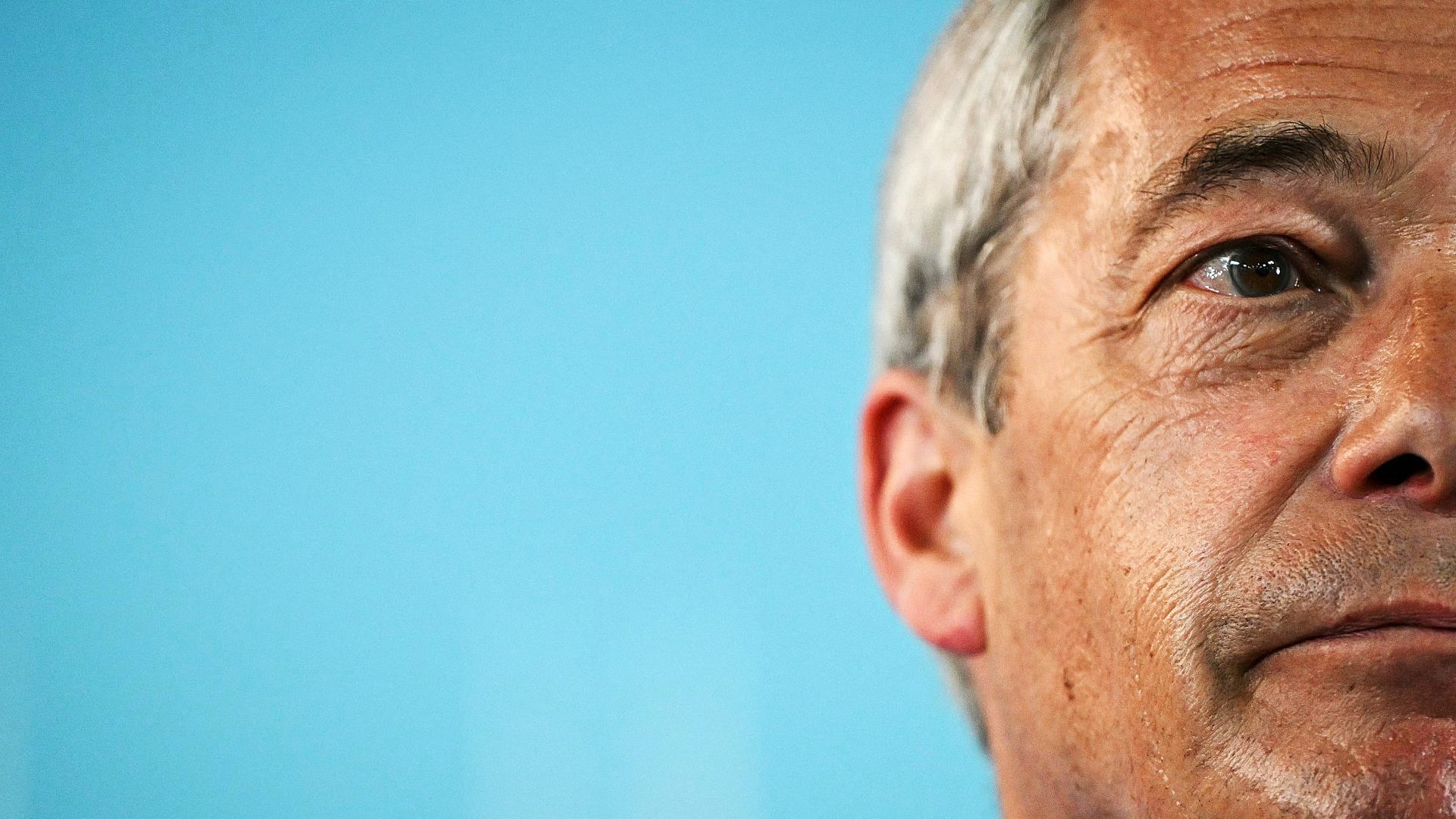Nigel Farage is the uranium-235 of British politics. Poisonously radioactive already, he awaits the correct configuration of public disappointment, resentment and bigotry – the necessary bombardment of neutrons – to achieve electoral fission.
One of the strengths of the Reform UK leader is that he understands that absolutely nothing is certain in the contemporary world. If there ever were reliable laws of politics, they no longer apply.
All systems of human interaction exhibit instability, uncertainty and volatility. At most, an actor within one of those systems can plan in terms of probabilities.
Which is why Farage is smiling. At last week’s Spectator parliamentarian of the year awards, he was named “newcomer of the year” – having at last being elected to parliament, as MP for Clacton, after seven failed attempts.
I presided over a few such ceremonies when I edited that magazine, and they are genial occasions, marked by banter and good-humoured barbs.
But Farage was not joking when he gave the audience a steely heads up: “At the next election in 2029 there will be hundreds of newcomers under the Reform UK label. We are about to witness a political revolution the likes of which you’ve not seen since Labour after the first world war.”
Hubristic, surely, from a man whose party only has five MPs? Maybe. But Reform won 14.3% of the vote, ahead of the Lib Dems on 12.2% (who, thanks to the quirks of first-past-the-post won 72 seats).
In a national opinion poll last week, Farage’s party pulled ahead of Labour for the first time. An outlier? Again, maybe. But Reform’s performance in such surveys has been steadily improving since the election.
At minimum, he has that most precious of assets – the public’s attention. Be honest. If two series dropped next Friday on Netflix – The Dark Deeds of Nigel Farage and The Evidence-Based Targets of Keir Starmer – which would you watch? Thought so.
As the prime minister flails under the weight of his own milestones, and Kemi Badenoch struggles to cut through, Farage has all the momentum. Reform now claims more than 100,000 members, including recent recruits Andrea Jenkyns, a former Tory minister, and Tim Montgomerie, a serious commentator of the centre-right and one of the earliest champions of “compassionate conservatism”. The defection of Suella Braverman’s husband, Rael, has intensified speculation that the former home secretary herself may join the ranks of Nigel’s Army.
The party now has more than 300 constituency branches, and is professionalising its operation, vetting prospective candidates much more carefully than was possible in the 29 days between Farage’s return as leader on June 3 and the election. Since July, Reform has been chaired by Zia Yusuf, a former Goldman Sachs banker and tech entrepreneur, not yet 40, who describes himself as a “British Muslim patriot” and personifies the movement’s new identity and ambition as a serious political force rather than a cobwebbed heritage club.
Last month, GB News, where Farage is the star presenter, pulled ahead of Sky News in the ratings for the first time. He has 1.1 million followers on TikTok, and 2.1 million on X. He is also nurturing friendship with the owner of the latter platform, Elon Musk, who was introduced to him by Donald Trump.
On The Winston Marshall Show last month, Farage recounted what the world’s richest man told him when he asked why he was so obsessed by UK politics: “There’s an emotional attachment… [Musk] said: ‘You are the mother country of the entirety of the English-speaking world, it really matters’… His level of knowledge [of the UK] was incredible”.
That “attachment” has been clear enough in Musk’s deplorable posts during August’s race riots and his persistent trolling of Starmer. Will it translate into financial support for Reform?
On November 30, a report in the Sunday Times speculated that the multi-billionaire was considering a donation of $100m to Farage’s party. Last week, Musk denied that he had such a plan – but not with much emphasis.
He has, after all, bought his way into Trump’s administration-in-waiting, as co-chair with Vivek Ramaswamy of the new “Department of Government Efficiency” which, he claims, will cut “at least $2tn” from the federal budget. Why not snap up a populist UK party for the hell of it?
For perspective: such a gift to Reform, worth around £78m, would be more than double what a political party contesting every constituency in the last general election was permitted to spend in the year before polling day (£35.1m). To comply with the rules, Musk would have to channel the funds incrementally and through (for instance) the UK branch of X. If he did so, the impact upon Reform’s electoral chances specifically and the political landscape generally would be transformative.
Even more important, however, are the existing contours of that landscape and the potential they already offer to Farage. In last Saturday’s Times, Sir John Curtice, the nation’s leading pollster, claimed that, if Reform is to break through it can no longer rely on “banging on about immigration”.
This is the opposite of the truth. Immigration is the ideal issue for populists because it is a proxy for so much else: fear of change, disorder, unemployment, social dislocation, overstretched public services, the housing shortage, wokery. There is almost no grievance that a cunning nationalist cannot connect to border control (famously, Farage once blamed his late arrival at an event in Wales on mass immigration and the fact “the M4 is not as navigable as it used to be”).
It is a huge boon to Reform, therefore, that, having promised for 14 years in office to reduce immigration, the Tories, according to their own criteria, failed so miserably. Last month, the Office for National Statistics reported that net migration to the UK for the year to June 2023 exceeded 900,000.
Meanwhile, Starmer is pusillanimously unwilling to make the case for migration as an economic necessity as well as cultural good, simply substituting “smash the gangs” for Rishi Sunak’s “stop the boats”.
The annual net migration figure may fall from its 2023 peak: the provisional figure for the 12 months to June this year is 728,000. But the headline figure will remain high – and rightly so.
We need newcomers to keep the economy growing, our public services staffed, and, with a declining birth rate, our future pensions funded. Until Starmer – or another progressive politician – has the courage to say this, and to reframe this most toxic of public debates, Farage will be pushing at an open door.
The populist politics of the 21st century is not about policy. Note, in particular, how emphatically Trump disowned the 900-page Project 2025 blueprint during his campaign. Detail is the devil for demagogues like the president-elect and Farage. Their pitch depends not upon a dossier of evidence-based proposals but a suite of themes that resonate powerfully with the electorate.
In the UK, as in America, immigration is by far the most important. But – especially since the pandemic, which changed politics more than is generally acknowledged – Farage has broadened his repertoire from Brexit and border control.
In March 2022, he founded the “Britain Means Business” campaign, demanding a referendum on the net zero carbon emissions target. He has made a talking point of “debanking” (also an obsession of tech libertarians in the US). He is increasingly drawn, he says, to the ideas of Robert F Kennedy Jr. “on Big Pharma, on prescription drugs”, if not (yet) on vaccines.
Farage has also become more explicitly hostile to Islam, alleging in an interview with Trevor Phillips on Sky News in May that “[we] have a growing number of young people in this country who do not subscribe to British values, [who] in fact loathe much of what we stand for”. His rhetoric edges perilously closer to the Great Replacement Theory: the vile claim that white people are being systematically supplanted by other ethnic groups, and especially those of Islamic heritage.
Knitting all these fixations together is Reform’s branding: “Family, Community, Country”. Typically of Farage, these three words manage to be both ostensibly bland and subliminally ethno-nationalist. Anyone with a glancing knowledge of 20th-century history will spot the surreptitious echo of Kinder, Küche, Kirche (children, kitchen, church), the blood-and-soil slogan so horribly weaponised by the Nazis.
Farage would, of course, deny such a symmetry, and condemn anyone pointing it out as a deranged member of the “woke elite”. But this is what he does so well: pushing the limits of political language ever closer to overt bigotry but always retreating tactically when he is danger of exile from mainstream debate. This is why he resigned in 2018 from the UK Independence Party (which he had previously led) over its nomination of Tommy Robinson as adviser on “rape gangs and prison conditions and prison reform”.
The art of being Nigel is rooted in the pursuit of plausible deniability. On June 16, 2016, his Leave.EU campaign released the appalling “Breaking Point” poster, depicting a long line of Syrian refugees. On the same day, the Labour MP Jo Cox was murdered by a man bellowing “Britain first!”
Yet Farage has always insisted that he is not a racist, and that he is anxious about “culture” rather than skin colour, about the strain on public services rather than ethnicity.
Those who think that he is making Labour’s life easier by “splitting the right” are not paying attention. Reform is emphatically not a conservative movement: the only thing its leader wants to “conserve” is something that doesn’t exist, and never really has: a socially monolithic Britain.
It has more in common with what, in the US context, has been called “heterodoxy”: the loose-knit coalition of those who detest mainstream politics, traditional elites, woke ideology, “globalism”, and “corporatism”. Farage is coming after Starmer’s base as much as Badenoch’s. His next test will be the local elections in May, in which he needs to pick up at least 100 county council seats. In 2026, Reform’s focus will shift to the elections to the Scottish parliament and (especially) the Welsh Senedd.
Nothing is certain. But that is how Farage likes it. The tumult, mayfly political cycles and unpredictability that so unnerve traditional party leaders are the context in which he thrives.
It suits him well for the earth to be trembling beneath his feet. The neutrons are boiling all around him.
Whether they achieve criticality, and generate political fission, is the most important question in British politics today.




